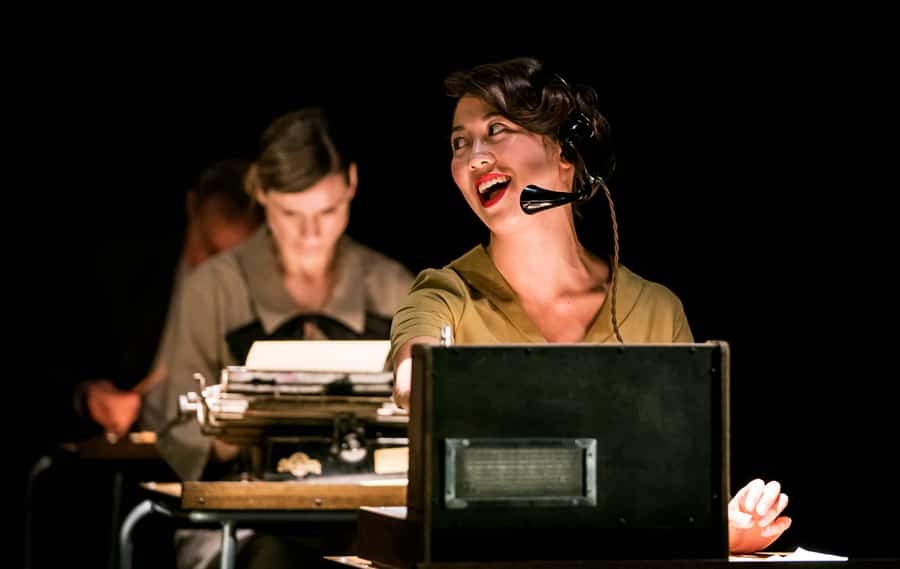Julian Eaves reviews Sophie Treadwell’s play Machinal now playing at the Almeida Theatre.

Machinal
Almeida Theatre
11th June 2018
3 Stars
Book Now
‘Machinal’ is one of the most thrilling and involving of American expressionist plays, breaking the rules of conventional drama hand over fist, and drawing us deep into the blighted lives of its simple and often inarticulate characters with its combination of frank directness, bold clarity, and astonishingly adroit stagecraft. Written by the unjustly overlooked Sophie Treadwell in 1928, while clearly owing a great deal to Elmer Rice’s ‘The Adding Machine’ of a few years before – especially in the picture it paints of the lives of ‘little people’ in an anonymous, mechanised urban world, where individuality counts for so little that it has become actually meaningless – this drama adds strength to its message by drawing in a consideration of what it means to be a woman in a society apparently run by and for men. The play is occasionally staged in this country; I saw it a couple of years ago in London, done extremely well by the graduating drama class at Kingston College. When I heard that the Almeida were reviving it, expectations ran high.

And there is much in the look of this production that rewards keen anticipation. Miriam Buether’s stage design – lit with flashes of intensity by Jack Knowles – is a profoundly sombre and claustrophobic world: her initial 1920s office-scape of rows of desks reflected and doubled by a mirror hung above them at 45 degrees (it remains for the whole evening), immediately recalls Gibbons and Gillespie’s unforgettable designs for King Vidor’s crowning achievement of the same year as this play’s creation, ‘The Crowd’; the expressionist gesture seems spot on, as does the erratic, broken, over-lapping dialogue of the opening scene, with its empty desk waiting to be filled by…. well, who?… or what?

By Emily Berrington. She plays the role of ‘A Young Woman’, which is about as much personality as the script recognises in her character: we realise we have seen her already in a fleeting impression of a crowded subway car, or tram, where bodies are pressed together, and a beautiful, Jean Seberg-like blonde, is suffering in their midst, her face set in a scowl of disapproval – or is it a pout of displeasure? At any rate, she brings her same quality of sour antipathy to her dreary office job, where her failure to ‘join in’ with the gang makes her the inevitable butt of mocking and hostile banter. And that is the first real surprise in this production by Natalie Abrahami: from the previous show, I retained no impression of this person, who is to be understood as the play’s protagonist, to be a weak or passive creature.

And yet, as the scene progresses, that appears to be exactly how Abrahami wishes her to be seen. She is single, and very much the target of her mildly predatory boss, who can’t wait to get her alone in her office for a bit of extra dictation. By the time that happens, and we are still only in the play’s second scene, we are already stifling the impulse to stand up in our seat and shout out at this dumb blonde: ‘Are you gonna let that guy talk to you like that? Where’s your sense of pride?’
Well, the answer to the first question is: Yes, she is; and the answer to the second question is: She hasn’t got one. She has no sense of her own self-worth, not the way Berrington plays and Abrahami has directed her. Yes, she may moan and complain about her role in life – who does not? – but she does so, always, from a position of whining self-pity, with not one iota of self-possession. This grates. And that does seem odd, to me, who has seen this character played in a radically different way in another production. I cared – a lot – about what happened to the Young Woman before, because she demonstrated some important human qualities that are denied her here in this show: dignity, self-possession, fortitude, perseverance, warmth and hope. And real anger, as opposed to the temper tantrums of a spoilt child.

In contrast, in this production, Abrahami and Berrington seem to have set their cap to impressing upon us that she lacks all these dimensions. Well, if that is so, why should we care what happens to her? Why should she matter? And, if she doesn’t matter, what are we doing in the theatre watching her make such a mess of her life? Does it help articulate a feminist viewpoint? Really? Do the men around her behave so abominably to all women? We don’t see any others getting into such scrapes. So gender hardly seems to be the key issue here. Lazy self-absorption and a cold-hearted approach to other people as only being there to serve her own purposes seem to be the Young Woman’s dominating characteristics, and jolly unappealing they are, too. When things go wrong for her, we are rather led to conclude that she has pretty much brought it all on herself, and rather deserves a suitable comeuppance. The absolute limit is reached when she bumps off her husband (Jonathan Livingstone), because he stands inconveniently in the way of her being with her lover (Dwane Walcott) – both, interestingly, cast as black actors – a murder for which she never once expresses the slightest remorse. Yet, faced with the electric chair, she ups the anti in her campaign of complaint and self-importance, begging to be spared, as if we might care. We do nothing of the kind.
If that is the best that Treadwell can do, then no wonder she’s ignored, many in the audience will conclude. But they will be wrong. It is the odd slant of this production to force us to see the playwright in this light that creates such a misguided judgement. And this should become clear when we see how softly and amiably most of the other characters play their parts. The nagging mum, Denise Black, is in fact a selfless workhorse who slaves away to keep her only child in as much leisure and comfort as she can; the office goons are only doing the best they can in the same limiting conditions and can be completely forgiven for failing to appreciate the YW’s abject inability to grasp any other point of view in life apart from her own. We ourselves would hate to have to work alongside someone so egotistical and shallow.
The longer the play goes on – and its mere 90 minutes end up seeming an eternity – the more our hearts go out to Nathalie Armin, Khali Best, Demetri Goritsas, Andrew Lewis, John Mackay, Alan Morrissey, Kirsty Rider and Augustina Seymour, who must struggle along with this difficult task. Dressed so naturalistically by Alex Lowde, they do seem like fish out of their expressionist water, especially when – for reasons which seem modish but not comprehensible – the decor suddenly leaps a decade, or two or three or four or more (you tell me whether you think this helps the story-telling). Ben and Max Ringham add in an impressive sound design, and Arthur Pita adds in some movement.
And how does it leave us at the end? Well, some people like it, but I think they would love another production even more: it is a great, a wonderful, an unforgettable play. Sadly, others do not think that this experiment, for all its wonderful lavishness, hits the mark. Whether the production satisfies those responsible for it is a matter for them and their private consciences: I have never seen anything else by this director and cannot comment further on her skills, beyond noting that her CV is impressive. Everyone appears to have done a very thorough, a perfectly good job, but the totality of efforts here doesn’t quite coalesce into a successful whole. Oh, well. Never mind. It’s not the end of the world. There will be other productions of this play, I hope. In the meantime, this just about does to be going along with.
Until 21 July 2018
